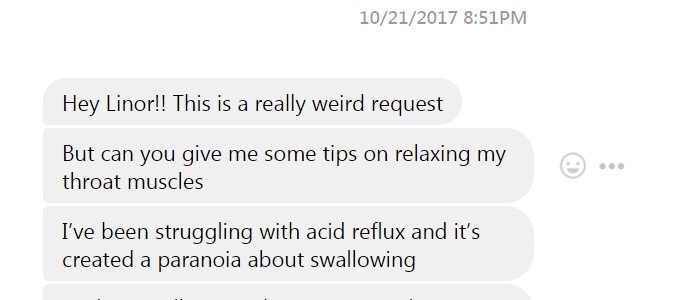In this article you’ll learn about the advantages and disadvantages of online singing lessons compared to real-life lessons. You'll also get an idea if and how to incorporate online lessons, depending on your situation.
Had you told me 15 years ago that people would be have online singing lessons, sitting in front of a screen, I wouldn’t have laughed. ‘Cuz it’s not funny. I would be horrified.
But these days, so many people, and not only the younger generations, will first try to learn something by looking it up online. I like teaching online myself, and find it effective.
By weighing the pros and cons, you’ll see when online learning works best, when in-person lessons might be preferable, and how to make online training as effective as possible.

This article is part of my Online Singing Lessons guide, where I cover the different ways to learn to sing online, from apps to courses to private coaching. Here, we’ll zoom in on one specific question: are online lessons actually effective?
How it began in 2017: Nick's online call for help
The first online lesson I gave was in 2017. Former student Nick wrote me a message on Facebook, after I moved from Berlin to Amsterdam, and could no longer teach him:

It was 40 minutes before Nick would have to go on stage. A severe case of reflux put him in pain whenever he swallowed and in a state of near panic. There were three choices I had:
- I could send him away, saying I am a great believer in real time teaching and don’t think online teaching is applicable to voice studies.
- I could write down a few exercises he could do and wish him luck
- I could Zoom with him for 10 minutes and try to help him by seeing what he does, instructing him on how to relax the muscles which bother him, and demonstrate to him what he could do.
I chose the third option. My 10 minute online emergency advice proved to be a quick fix and it helped him relax his throat and breathing. I showed him how to relax the muscles and he later said it helped him perform.
My tips helped him a lot and that got me rethinking my stand on online lessons. It kicked off my online singing teaching career.
Positively surprised with online singing teaching
The first full online singing lesson I gave after the Nick event, I was surprised by how much I could contribute to the student without being able to approach him. Most “wrongs” I had to “right” were audible and visible. I have been training myself to detect difficulties in the voice, and it is possible, I’d say 90% of the time, to do it online as well. Through online experience, I can detect vocal issues by watching at the singer's posture - that can be helpful if the sound fails on us for a split second.

Explaining something to an online student
The limitations
Still, that 10 percent. Some people look like they are doing everything right, and still their sound isn’t free. In person I could go up to them, put my hand on their neck, shoulders, chest, and see what’s going on. If it’s an online lesson, how will I figure it out?
If my method goes hand in hand with body awareness, which it does, teaching through a screen sounds really tricky to me. I work a lot with placing my hands on the student’s body and guiding them to correct bad posture, breathe properly, release tension etc.
But let’s assess for a moment what I need as a teacher, and if there is a way to do it “hands-off” (besides, my student might be ultra orthodox and won’t be interested in me touching them anyway).
Pros and cons
Pros
- Keep the process going
You can keep seeing your teacher, even if you're travelling or tied to your home. No gaps in the continuity of your practice. - Recording the lessons is easy Online tools such as Zoom make it super easy to record and review your lessons. Be reminded of the exercises and instructions, hear your own voice.
- Be spontaneous with appointments
As in my example with Nick, you can do an 'emergency' video call without scheduling far in advance, or travelling far.
Cons
- Can feel less personal
Singing is an intimate activity. Physical closeness helps. - Singing together not possible
Simultaneous audio is not an option in most apps - No hands-on feedback
Correcting posture can't be done by the teacher's hands. - Ceiling effect
There's a limit of what you can learn by ONLY taking online lessons.
How to make up for the limitations
When a student makes a sound, I look and listen. I first make sure that the visible behavior of the body is healthy. I also listen for a healthy functioning of the vocal cords, and work on that if needed. I ask the student to turn and show me their posture from the side as well as the front. These are the 90% that are manageable so far.
When the student’s voice sounds forced to me, but looking at them I don’t see any muscle tension manifesting itself (this is less common), I need to find the source of the tension in another way.
The tension could come from any number of areas in the body: The back of the neck, the throat, the jaw, the tongue, the shoulders, the chest or any combination thereof. Of course I have exercises for releasing each and every part, so I go one by one, and see which one creates the biggest different in the sound. And then I know the source of the problem and can target it.
Yes, it’s a longer process, but it’s also more thorough.
But fear not. It is, as said, usually not that challenging. With my online student Ido, a dream come true of any teacher, online is pretty close to what it would be in real life, I would assume. His ability to develop body awareness is above average, so he will understand quickly what I mean and inform me of that. Then he takes the new pointers he learned and works on them throughout the week, coming to the next lesson 70% better already. With a student like that it’s relatively easy to get the information across, and even an obstacle like compromised sound quality (which can happen if there is WIFI trouble) is not a big problem.
The bottom line is that the success of the lesson depends on both the teacher and the student, just like in live, in-person lessons. It depends on how developed a student’s awareness of their body is, and how helpful the teacher’s advice is. For some it will take longer than for others, but that’s true for offline lessons as well.
Real-life singing lessons
Pros
- Personal
Singing is an emotionally intimate activity. Closeness can help. - Hands-on
Inspection and adjustment of posture is better done in real life. - Good connection
Wifi issues are not a thing when two people talk in real-life. - Asynchronous feedback possible
A student can send a video fragment and the teacher can respond in their own time
Cons
- Fewer teachers to choose from Not every teacher that you click with or offers the specialty you need lives close.
- Colds, infections, allergies
In a small space, both your and your teacher's voice are sensitive to infections and allergens. - Travelling
Travelling to your teacher takes time that you could have spent on... practicing.
About the author

I’m Linor Oren, founder of SingWell. I have an opera background and in the past I've performed on stage. I've taught hundreds of students how to find their authentic voice. What I’ve learned is that singing isn’t about being “born with it” — it’s about unlocking what’s already inside you with the right tools and guidance. My passion is helping singers at every level grow in confidence, technique, and joy, so they can sing with freedom and expression.
When you should take online lessons
Based on the pros and cons of both online and real-life singing lessons, I've worked out a few scenarios for different kinds of imaginary students. How can they incorporate online lessons in their singing training?
A person like John I would recommend that he takes online lessons with a teacher of his choice. If, after reaching a decent level, he is still ambitious, John should definitely get out of his bubble and go to a singing school or start doing workshops, in addition to his (online or offline) lessons.

"
Important caveat: In my experience, the learning process speeds up when you have interaction with your teacher between lessons. So even if you go to your teacher regularly for real-life lessons, I strongly recommend having online contact with your teacher between the lessons: so you'll practice more effectively between lessons.
As Vincent is not on the other side of the country, I would advise him to start with a couple of real-life lessons. Get the fundamentals in order. Then, he can sustain himself with online lessons. Whenever he needs a higher level of personal attention, he can travel for the occasional real-life lesson.
Coco can start with real-life lessons and continue taking these whenever it suits both her and her teacher. If she has a long day at work, she could win some time by doing an online lesson for a change. Same if she feels a bit ill or if her or her teacher are out of town.

Jim Snyder, lawyer and event singer
Jim: 'Before the program, I didn't feel as confident. Therefore I just turned up my guitar more. I was amazed by the progress before this program, when I just took some lessons with you. But it's really accelerated with this program. I'm on a roll. 'People think I magically became a good singer. I feel like I'm a more well-rounded performer now. My little music career, I feel like it means a lot to you. And that means a lot to me.'

Dhritigna, college student
Dhritigna: 'i went to like more than 10 doctors for my vocal issues and got completely different diagnoses, even advice to get surgeries. After working with you, the stress and pain have gone, and I can sing with ease and use more power. That's a really huge thing for me: it affects the confidence as well on stage. I'm so grateful for it!'
For beginners
For beginners, online singing lessons lower the threshold of taking that first step. They don't have to go to a house and sing in front of another person. In the comfort of their own home, they can make their first baby steps.
There's an interesting flipside to this though. A lot of beginners feel shy about singing in their own home. Will my boyfriend/mother/neighbor hear me? The discomfort around this can border on anxiety. An online lesson can take this shyness away: there is no way around it! It forces beginners to sing in their own home, but with the gentle guidance of their teacher. Home practice is necessary if you want to make progress.
So what's the verdict?
Online lessons are not as effective but almost as effective as real-life lessons (90% I would say). And they can be useful in a practical sense.
From my experience, teacher and student will be positively surprised about how much can be learnt.
Online lessons urge beginning singers to sing in their own homes: necessary for future practice/improvement.
Online interaction between lessons is extremely valuable: it holds students accountable and corrects their practice between lessons.
What's next?
If you’ve decided online might be right for you, the next step is choosing the format that fits best. Should you go for a structured course, an interactive app, or one-to-one coaching? To help you decide, I’ve reviewed laid out the options in a guide to navigate online singing lessons.
Is the singing world rising to the occasion? Well, there are online singing tutorials on the web, an entire ocean. For an overview of all the online tools, and a general discussion on the topic, go to my online singing lessons article. I also have online programs and literally share hours of vocal exercises videos.
Can we put our trust in this form of learning when it comes to singing? Where I come from, the classical old-fashioned vocal training, I needed some serious convincing. But, after diving into this online world for a few years now, I’m impressed.
No longer a little mouse...
Maybe you feel it's time to stop shushing your own voice and take your desire to sing serious. My weekly 'Belting Mouse' mail shows you how. It gets you on track with stories and insights from my life as a singer and that of my students.

For 'little mice' who are tired of squeaking and want to start belting...
Frequently Asked Questions
Are online singing lessons as effective as in-person lessons?
Online lessons can be highly effective when both teacher and student stay attentive and communicate clearly. While physical adjustments are limited, most vocal issues can be heard and seen through the screen. With consistent feedback and awareness, you can make the same kind of progress as in live lessons.
What do I need to get started with online singing lessons?
You need a stable internet connection, a quiet space where you can sing freely, and a device with a camera and microphone. Headphones can help improve sound quality, and recording your sessions lets you review exercises and track your progress.
How do I know if online lessons are right for me?
Online lessons are ideal if you value flexibility, travel often, or do not have a teacher nearby. They work well if you feel comfortable learning in your own space. For singers who benefit from physical guidance, combining online and in-person lessons can offer the best balance.

pls help me sing better my friends i can’t sing